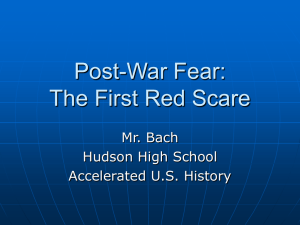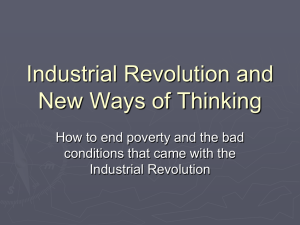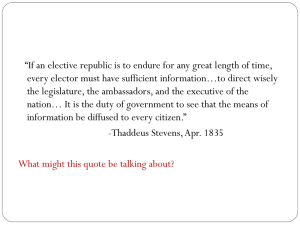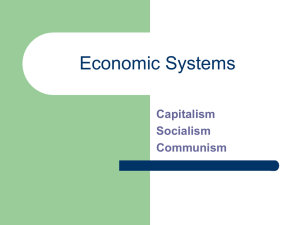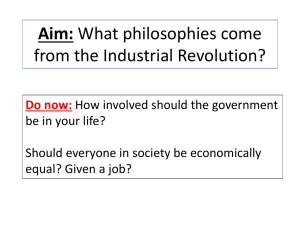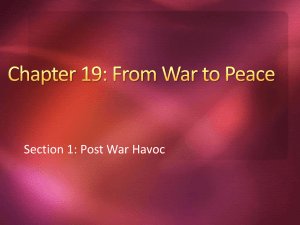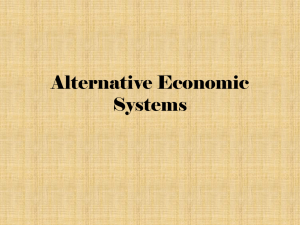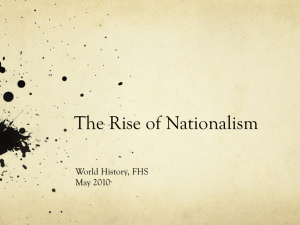PowerPoint 1-2 - Lincoln School
advertisement
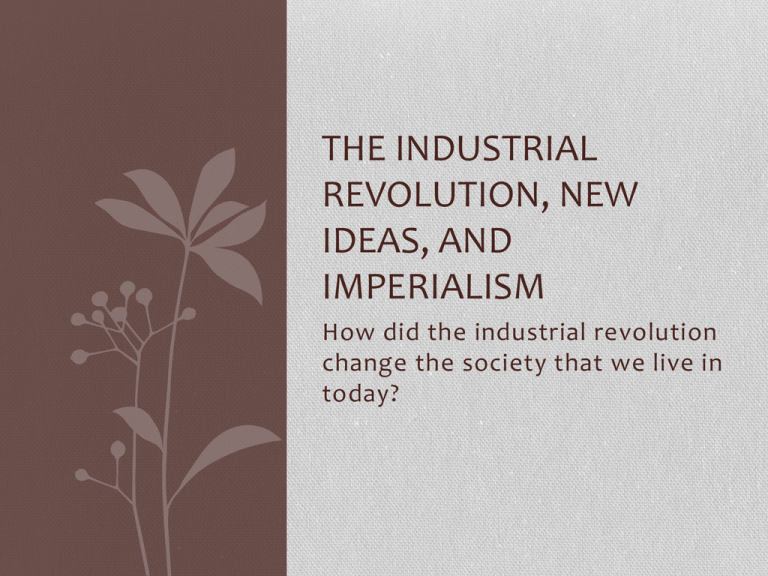
THE INDUSTRIAL REVOLUTION, NEW IDEAS, AND IMPERIALISM How did the industrial revolution change the society that we live in today? The Industrial Revolution • What was it? • New way of producing goods and products that used new technologies to dramatically increase productivity • What are the major features of the industrial revolution? • • • • Factories Cities New technologies More stuff: because of new technologies each person could make more goods than before, more goods per person means what? • When was it? • Began in the 1750’s is still going on today • Where did it start? • England, but soon spread to the rest of Europe, North America, Asia, and the rest of the world • Why is it significant? • Changed almost every aspect of life: increased standard of living, new roles for women, big cities, new social classes, new ideas, new sources of power for countries Example of an Early New Technology: Spinning Jenny Power Loom Inside an Early Factory Early Steam Engine Pump Early Steam-Powered Locomotive Bad living conditions in industrial cities The Industrial Revolution Leads to New Ideas: Socialism • Socialism: the idea that the people (the government) should control the economy and private property in order to benefit all of society and not just a few individuals • What caused this idea? • Poor working and living conditions due to industrialization made many people unhappy • Pros and Cons • Pros—the people are in control of the economy (democratic), gave people a way to fight poverty and poor working conditions in factories • Cons—the people (govt.) get to tell private individuals what to do with their property, also will socialism even work? • Other ideas that were a part of socialism: • Democracy—let everyone vote (rich/poor, men/women, racial/ethnic minorities) • Women’s rights—equality between men and women The Industrial Revolution Leads to New Ideas: Communism (Marxism) • Communism: the idea that all economic activity should be owned and controlled by the community. Ideally there would be no social classes and no state, just people living, working, and sharing wealth together • Question: In what ways does communism sound similar to socialism, in what ways does it sound different? • Communism was related to socialism but more radical and more violent • First written about in a book: The Communist Manifesto written by Karl Marx and Friedrich Engels – 1848 • Other ideas related to communism • Class consciousness • Anti-religion Communism (Marxism) Cont. • Marx believed that throughout history there had always been a class of haves and have-nots (rich and poor) • As technology improved and the economy changed the groups also changed, but the rich always oppressed the poor • With industrialization problems had gotten much worse, workers were barely making enough to survive • Eventually things would get so bad for workers that they’d have two choices: 1. 2. Keep working and slowly starve to death Join forces with other workers and start an international revolution against the rich • After this worldwide revolution Marx predicted that eventually a society with no classes (no rich and no poor) and no government would eventually emerge—this society would be communism • Pros and Cons of Communism? • How would the industrial revolution have helped create an idea like communism? Flow of History According to Marx Stage of History Ancient Times Middle Ages Industrial Revolution Haves Patricians Nobility Middle/Upper Class: Bourgeosie Have-Nots Slaves/Plebes Serfs Working Class: Proletariat Communism One united social class Older ideas that are still influential • Nationalism • Liberalism • Conservatism Recap: Battle of Ideas • New ideas that wanted to change the social, economic, and political order (radical ideas) versus conservatism • Radical Ideas: very radical (left) • Communism (most radical) • Socialism • Moderate Ideas: only a little radical (middle) • Liberalism • Nationalism • Conservative Ideas: the opposite of radical (right) • Conservatism • Europe during the first half of the 1800’s was a battleground for these ideas, conservatism was fighting everything else • Lots of Revolutions in 1830 and 1848 Late 1800’s: Communism and Socialism vs. Nationalism • Second Industrial Revolution • Industrialization spread to almost every type of job • Industrialization spread from England throughout the rest of Europe and even North America and Asia (Japan) • As industrialization spread its advantages and its problems spread too • Socialism and communism became important forces in most European countries as poor working and living conditions spread • Marx’s theory seemed to be coming true • Question: Why did Marx’s inevitable communist revolution never take place? • Answer: Several things combined to prevent the revolution • Technologies improved the quality of life for workers • Governments reformed themselves and gave ordinary workers more say in the government • Nationalism proved to be a more powerful idea than communism Problems with Nationalism • We vs They mentality • Nationalism united people of the same ethnicity, but what about people who were different? • Wars of nationalism • Italy • Germany • Balkans • Conflicts within countries • • • • AustriaAustria-Hungary Russia Ottoman Empire Ireland • Intense rivalries between nations • Bad treatment for those regarded as outsiders • Anti-Semitism: hatred of Jews • Dreyfus Affair in France • Anti-Semitism led to the creation of Jewish Nationalism—Zionism • Theodore Herzl • A homeland for the Jewish nation somewhere—eventually settled on Palestine
